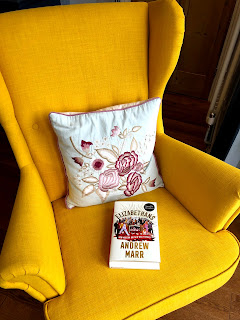 |
| Lots of bedtime reading... |
The 2020 festival has been as stimulating as ever, bar a few interruptions as people wandered into my viewing suite (aka kitchen): Mum, what's for supper? or Has anyone seen my wallet? In response, I've had to ramp up my particular superpower, an ability to zone-everyone-out while I'm focused on something more interesting (a skill usually only deployed on long car journeys).
An added bonus was dipping my toe into the virtual Cheltenham Literature Festival this year, which comes hot on the heels of Henley. The last time I visited the Cheltenham Litfest was as a schoolgirl - I remember sitting in a small room off the Town Hall listening to a performance of Tristram Shandy. Anyway, this year, the festival was running a free live feed of its events, ranging from a concert by the charming and talented Kanneh-Mason family to Christina Lamb discussing women in war.
So you win some, you lose some. I've missed the immediacy and ambience of face-to-face meetings at #HenleyLitFest, but I have welcomed #CheltLitFest back into my life.
More literary nuggets from the two festivals
Andrew Marr, The Elizabethans - How modern Britain was forged... "If you really want to find out about missing aspects of history, go to contemporary novelists of the time," he told Dame Katherine Grainger during his Henley interview. For example, Muriel Spark on single people. Marr also thinks "the rise of populism around the world may have peaked", which means Trump is no longer so unstoppable. Let's hope so.
Novelist Beth Morrey, Saving Missy... "I couldn't have written a good book in my twenties," she said during a Dazzling Debuts session at Henley. Apparently she needs "long tranches of time to have a think and write rubbish" which she then puts to one side. "None of the rubbish is a wasted - you just need to churn through it to get to the other side." A comforting insight into the writing process.
Peter Snow and Ann Macmillan, Treasures of World History: The story of civilisation in 50 documents... Talking at Henley, Peter chose to highlight the inclusion of Shakespeare's first folio 1623 in their book. This folio collected together all 36 plays for the first time. Shakepeare's contemporaries, who documented the plays in the folio, even asked actors to remember their lines from previous performances. Without this folio, Macbeth and Twelfth Night might have been lost.
 |
| The very articulate Elif Shafak Credit: Zeynel Abidin |
Christina Lamb, Our bodies, their battlefield... From Cheltenham, Christina argued that women's stories have been written out of history, particularly in the context of war. In her book, she includes harrowing interviews with traumatised Yazidi women, used as sex slaves by Isis. Christina said she partly wrote the book because her newspaper editors wouldn't always publish her work about exploited women. "This is not what people want to read," they told her.
Elizabeth Strout, Olive, Again... In her interview at Cheltenham, the American novelist described the last four years under Trump as "absolutely horrifying". As the US election approaches, she feels like there is "a noose tightening around my neck". Talking of her bestsellers, based around the eponymous character Olive Kitteridge, she said she has tried to "record the human experience as honestly as I can".
Ann Patchett, The Dutch House... told the Cheltenham audience she was "an introvert who has been living the life of an extrovert my entire life". Now she no longer has to get on planes, attend cocktails parties or give talks, she feels like herself for the first time. "I had to figure out my scaffolding to hold myself up and now it has gone.... and it's a beautiful thing." She threw away the first draft of her new book, The Dutch House, because it wasn't good enough, "like a cake left in the oven too long". The new version is about a brother and sister, dealing with a chilly stepmother and the loss of their family home.
No comments:
Post a Comment